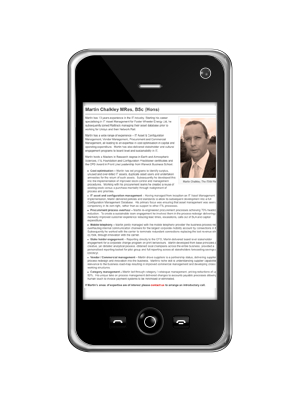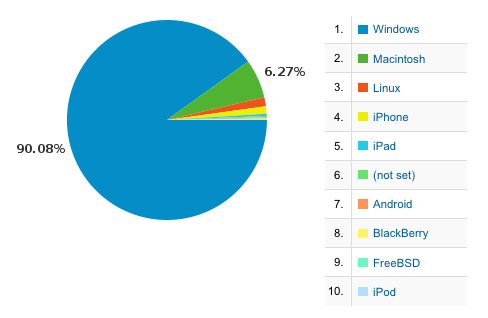Are You Paying Too Much For Your Mobile Service?
 This is the second article from ITAM Review Analyst Martin Chalkley. See other articles from Martin here.
This is the second article from ITAM Review Analyst Martin Chalkley. See other articles from Martin here.
Mobile telephony, be it straight mobile phones, Blackberries or Data Cards is one area which can yield surprising savings. These days all these devices have become de-facto tools of the enterprise. Maintaining an open channel of communication for employees is now a standard requirement in all businesses and the growing trend for provisioning and managing such devices should be considered part of the asset management span of control.
As we all become more mobile in our operations, and with the pressures of modern businesses to continue to succeed, the distribution of these assets, for that is what they are, is becoming ever more widespread. They don’t necessarily fit the original scope of asset management, but it is predicted that growth in mobile devices will exceed the size of the desktop estate within just a few years. So why not get a better handle on them now?
Accessing systems, data and the internet whilst on the move will become more of our daily routine. When truly was the last time you actually powered off either your business or personal mobile? How many employees in your organisation take their mobile devices on holiday with them, either to clear their email afraid of the impending workload on their first Monday back, or just simply because they feel a need to be contactable away. Laudable dedication it may be, but the proliferation of these devices is unstoppable.
It is believed that for every mobile device in use worldwide, there is a second languishing in a draw or cupboard somewhere. This should set the opportunity bells ringing for the hardened Asset Manager.
What can you do?
Firstly do you have access to the billing records from your mobile provider? if not make it a priority! There are certain bits of information that you should be looking for;
- Usage data (calls, texts, data)
- Listed owner
- Listed owner’s HR data (cost centre and payroll number as a start)
- Mobile provider information (sim, IMEI, model, tariff)
These are just the basics, but will pinpoint, after marrying data up with your own internal systems (HR, BES server, Active Directory), where discrepancies are appearing. These discrepancies, as with your asset estate, are what you should then be focussing on as this is where your savings will materialise.
Essentially you will, as you would with your asset estate, be looking for the inconsistencies;
- Multiple device ownership (possible convergence)
- Listed owners no longer in the company
- Zero usage (switch it off!)
- Tariff volume discrepancies (charging for Blackberrys not on your BES?)
So are you really going to save much money?
Unless there is already active management within the company, then yes absolutely. You will undoubtedly be on a contractual term with your service provider and as such it is not really in their interests to help you manage out unnecessary cost, after all, they usually only expect to come into profit on your contract in year 3 onwards. So lets assume you can identify 100 Blackberrys in your estate which have zero usage over a sustained time, and two years left to run on the contract. Given the approximate connection cost of a Blackberry device is £20-£25/month, then you will actually save £24-30k over the remainder of the existing contract term.
Add this to other connections you can terminate and the scope for saving is indeed significant.
Your mobile provider will also know that as attractive as it may be, the upheaval of transitioning service providers is low. At contract renegotiation you will be offered an attractive enough proposition to remain with the existing company. Similarly, whilst you may believe that you are paying a hefty sum for your mobile capabilities, the service provider will believe that they have much more to make out of it by delivering innovation to you. More on that later.
What else can you do?
There are other ways in which you can look to save money in the mobility estate:
- Allow your employees to choose their own device, you simply provide the connection
- Undertake an amnesty of all those devices in the cupboards and draws, there are plenty of companies who will take them off your hands and rebate you their worth
- If not already being done, recharge the mobile costs to the cost centres, which will focus their minds on reducing costs
- Investigate the international charges for those who need to use the Blackberry abroad (even when on holiday!). Is a short term daily roaming rate cheaper than a monthly roaming rate for the duration of their trip?
- Don’t automatically replace broken Blackberrys, commonly a cracked screen, lost rollerball, cracked case. You can buy parts on various websites at minimal cost (approx £5-10) and there are bound to be technical gurus in the department who would be more than happy to swap parts around. You may invalidate the warranty, but you were going to throw it away anyway and spend upwards of £150 on a new one, so you’ve saved £140 for each one you fix.
- Charitable donations of broken or aged phones may help with the corporate image, alternatively keep the recycle value for the enterprise.
Mobile Innovation
As stated earlier, in the not too distant future mobile device usage will exceed the traditional desktop. Therefore create positive relationships with your mobile carrier. They will have a range of opportunities for innovation to be delivered to you, which may provide huge benefit to your organisation. Some examples are;
- Lone worker protection
- SMART metering
- Picture transfer for immediate decision making / audit
- Remote CCTV
- Mobile applications supporting your employees / customers
Summary
The world is going mobile, unstoppably so. You need to manage such proliferation to ensure that your costs don’t escalate or remain hidden. Similarly you need to embrace innovative ways in which you can manage your estate to reduce the baseline cost, as it is unlikely that your mobile provider will tell you where to look, or help you do so. However creating a positive relationship and embracing the pace of change and innovation will deliver the mobile providers aims to increase revenue from your account, whilst delivering opportunities to your business that will be outside of the traditional role of the IT department.
This is the second article from ITAM Review Analyst Martin Chalkley. See other articles from Martin here.

50% of Top 10 Devices Reading The ITAM Review are Mobile - Although Vast Majority ~90% in Volume is Windows
Can’t find what you’re looking for?
More from ITAM News & Analysis
-
ITAMantics - April 2024
Welcome to the April 2024 edition of ITAMantics, our monthly news podcast where we discuss the biggest ITAM stories from the last month. George is joined this month by AJ Witt and Ryan Stefani. Stories tackled ... -
Broadcom is removing expired VMware licences from its portal - take action now!
Hot on the heels of Broadcom’s announcement of the end of perpetual licences for VMware it has given customers barely a week to download any keys for licenses from its portal with expired support. This is ... -
Who Loses When Broadcom Wins?
News of a new Broadcom deal rarely arrives with great fanfare. The November 2023 VMware acquisition provoked open worry online and in business circles, with many critics wondering whether the former Hewlett-Packard spinoff’s reputation would prove ...